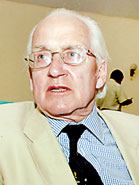Life after Everest
View(s):Doug Scott who was part of the team who made history in 1975 by scaling the Southwest face of Mount Everest talks about his work to help the community of Sherpas in his beloved Nepal
At 72, Doug Scott has a few souvenirs from a career in mountaineering. Among them: arthritic ankles that never quite recovered from being broken, an enduring love of the sport that has him returning to the slopes whenever he can and a profound attachment to Nepal and her people, particularly the Sherpas who he has entrusted his life to more than once.

Doug Scott
As part of the first British team to make the ascent of the Southwest face of Mount Everest in 1975, Doug is a mountaineering legend who has reached the summit of over 40 peaks. Convinced that he “might as well do something useful” with his retirement he founded the Community Action Nepal (CAN).
“When you get to my time of life – 72 – you can’t do what you used to do any longer but if you’re reasonably committed, you find what you did helps you facilitate projects wherever they’re needed,” says Doug. CAN, which owes something of its existence to a conversation with two Sherpas over an open fire, now engages in over 40 community welfare projects that reach a quarter of a million people, some of whom live in the most remote and poverty stricken regions of Nepal.
He has also been involved in setting up a co-op that ensured porters were treated better during expeditions. Doug has always marvelled at how well Sherpas are adapted to their environment. “They really are a remarkable people. In their prime, there was nothing they couldn’t do and wouldn’t do for you if the chips were down. It’s not just because they’re stronger, but also because they are perhaps more caring, not blinkered by ambition.” On a mountain often considered ‘too high for morality’ they were indispensable.
Doug first visited Nepal in 1972, returning in 1975 for his epic climb. He remembers that particular expedition best for their bivouac, just 100m down from the summit. They spent the night without sleeping bags or oxygen and survived without frostbite. The experience would give Doug an enduring love for the simpler “alpine style” climbing.
However, the very next year would bring a descent that would eclipse their achievement on Everest. Doug, his friend Chris Bonington and 2 others made a harrowing descent down Baintha Brakk (known to climbers as The Ogre), a 23,901-foot rock and ice tower in Pakistan’s Karakoram range. While rappelling down, Doug slipped on some ice and ended slamming into a rock wall feet first. “I ended up with two broken legs at 7,200 metres,” he says. In another accident, Chris broke two ribs. Even with the help of their friends, between their agonising injuries and the onset of stormy weather, it took them 8 days to make it to the base.
As always, reaching the bottom was Doug’s reward. The exhaustion of the climb always had the effect of calming him – “it’s in the space between thoughts that is very peaceful,” he says, “it has the effect of slowing down the internal dialogue you have every day. Perhaps that’s why it says you come back home with a lot more enthusiasm after a climb.”
Doug, who remains deeply involved with CAN projects, also tours, addressing audiences around the world and raising funds for CAN. In Sri Lanka he says he hopes Nilupul will be able to support people affected adversely by the war, particularly children who have fallen prey to difficult circumstances. In the meantime, he has a bit of advice for me. Pointing to a bad leg with “lots of screws in it” he says grinning ruefully, “watch yourself, don’t break your joints. It catches up with you when you’re older.”
Follow @timesonlinelk
comments powered by Disqus





















